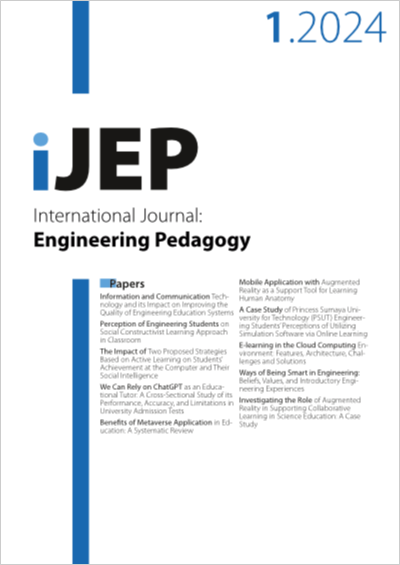Ways of Being Smart in Engineering: Beliefs, Values, and Introductory Engineering Experiences
DOI:
https://doi.org/10.3991/ijep.v14i1.41633Keywords:
First-year engineering education, multi-method, equitable classroom practicesAbstract
Common discourse conveys that to be an engineer, one must be “smart.” Our individual and collective beliefs about what constitutes smart behavior are shaped by our participation in the complex cultural practice of smartness. From the literature, we know that the criteria for being considered “smart” in our educational systems are biased. The emphasis on selecting and retaining only those who are deemed “smart enough” to be engineers perpetuates inequity in undergraduate engineering education. Less is known about what undergraduate students explicitly believe are the different ways of being smart in engineering or how those different ways of being a smart engineer are valued in introductory engineering classrooms. In this study, we explored the common beliefs of undergraduate engineering students regarding what it means to be smart in engineering. We also explored how the students personally valued those ways of being smart versus what they perceived as being valued in introductory engineering classrooms. Through our multi-phase, multi-method approach, we initially qualitatively characterized their beliefs into 11 different ways to be smart in engineering, based on a sample of 36 engineering students enrolled in first-year engineering courses. We then employed quantitative methods to uncover significant differences, with a 95% confidence interval, in six of the 11 ways of being smart between the values personally held by engineering students and what they perceived to be valued in their classrooms. Additionally, we qualitatively found that 1) students described grades as central to their classroom experience, 2) students described the classroom as a context where effortless achievement is associated with being smart, and 3) students described a lack of reward in the classroom for showing initiative and for considerations of social impact or helping others. As engineering educators strive to be more inclusive, it is essential to have a clear understanding and reflect on how students value different ways of being smart in engineering as well as consider how these values are embedded into teaching praxis.
Downloads
Published
How to Cite
Issue
Section
License
Copyright (c) 2023 Dr. Amy Kramer, Dr. Rachel Kajfez, Dr. Emily Dringenberg

This work is licensed under a Creative Commons Attribution 4.0 International License.



